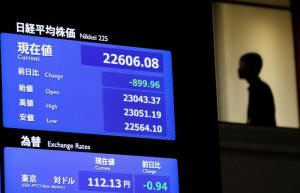|
Stocks sell-off slams back into Europe
 Send a link to a friend
Send a link to a friend
 [October 11, 2018]
By Marc Jones [October 11, 2018]
By Marc Jones
LONDON (Reuters) - European stocks slumped
to a more than an 18-month low on Thursday after Wall Street's worst
losses in eight months triggered a surge of global selling that knocked
over Asia too.
Losses in London <.FTSE>, Paris <.FCHI> and Milan <.FTMIB> were already
climbing toward 2 percent in early trading, although the selloff wasn't
quite as dramatic as the overnight session in Asia.
MSCI's broadest index of Asian shares not including Japan
<.MIAPJ0000PUS> ended down 3.6 percent, having struck its lowest level
since March 2017. China's main indexes had slumped over 5 percent [.SS].
It meant MSCI's 24-country emerging market index <.MSCIEF> was having
its worst day since early 2016, after Wall Street's swoon had given the
47-country world index equivalent <.WORLD> its worst day since February.
"Equity markets are locked in a sharp sell-off, with concern around how
far yields will rise, warnings from the IMF about financial stability
risks and continued trade tension all driving uncertainty," summed up
analysts at ANZ.
The sell-off, which came as the head of the International Monetary Fund,
Christine Lagarde, said stock market valuations have been "extremely
high", erased hundreds of billions of dollars of global wealth .

Japan's Nikkei <.N225> ended down 3.9 percent, its steepest daily drop
since March. The broader TOPIX <.TOPX> lost around $207 billion in
market value, falling 3.5 percent.
Shanghai's <.SSEC> drop was its most severe since February 2016 and left
it at its lowest level since late 2014. Shares in Taiwan were even
harder hit <.TWII>, losing 6.3 percent. Seoul's Kospi index <.KS11>
dropped 3.8 percent.
"I think what happened was that we were a maximum elevation of risk
appetite and maximum valuation of (U.S.) large caps and tech, so when
you have that situation you are always vulnerable," said UBP macro and
FX strategist Koon Chow.
Europe's traders retreated to the safety of German and other
higher-rated government bonds.
Italian bonds aren't on that list, and they saw more selling before a
key set of auctions, amid ongoing concern about the country's financial
health. [GVD/EUR]
"It remains to be seen whether the accelerating equity plunge is a
healthy correction or the tip of the iceberg," Commerzbank analysts said
in a note. "For sure it creates a more challenging environment for
today's (Italian) auctions."
BLOOD ON THE STREET
Sinking global shares have raised the stakes for U.S. inflation figures
due later on Thursday. High inflation would only stoke speculation of
more aggressive rate hikes from the Federal Reserve.
On Wall Street, the S&P500's sharpest one-day fall since February wiped
out around $850 billion of wealth as technology shares tumbled on fears
of slowing demand.
The S&P 500 <.SPX> ended Wednesday with down 3.29 percent, the Nasdaq
Composite <.IXIC> 4.08 percent and the Dow <.DJI> 2.2 percent.

The bloodletting attracted the attention of U.S. President Donald Trump,
who pointed an accusing finger at the Fed for raising interest rates.
[to top of second column]
|

A man is seen behind an electronic board displaying the Nikkei
average and Japanese yen rate againt the U.S. dollar at the Tokyo
Stock Exchange in Tokyo, Japan, October 11, 2018. REUTERS/Issei Kato

"I really disagree with what the Fed is doing," Trump told reporters
before a political rally in Pennsylvania. "I think the Fed has gone
crazy".
Hawkish commentary from Fed policymakers triggered the sell- off in
Treasuries last week and sent long-term yields to their highest in
seven years.
The surge made stocks look less attractive compared with bonds while
also threatening to curb economic activity and profits.
"The rise in Treasury yields has been the primary catalyst for the
sell-off in equities, since higher yields suggest a lower present
value of future dividend streams, assuming an unchanged economic
outlook," said Steven Friedman, senior economist at BNP Paribas
Asset Management.
"It is also possible that equity investors are growing concerned
that the Federal Reserve’s projected rate path will choke off the
expansion."
YUAN A FLASHPOINT
The shift in yields is also sucking funds out of emerging markets,
putting particular pressure on the Chinese yuan as Beijing fights a
protracted trade battle with the United States.
China's central bank has been allowing the yuan to gradually
decline, breaking the 6.9000 barrier and leading speculators to push
the dollar up to 6.9377 <CNH=> at 0602 GMT.
China's move has forced other emerging-market currencies to weaken
to stay competitive and drawn the ire of the United States, which
sees it as an unfair devaluation.
"The yuan has already weakened significantly, to offset the tariffs
announced so far," said Alan Ruskin, Deutsche's global head of G10
FX strategy. "Further weakness could exacerbate concerns of a
self-fulfilling flight of capital and a loss of control."

The dollar was already losing ground to both the yen and the euro,
as investors favored currencies of countries that boasted large
current account surpluses.
The euro was at $1.1550 <EUR=>, up from a low of $1.1429 early in
the week. The dollar lapsed to 112.17 yen <JPY=D3>, a retreat from
last week's 114.54 peak.
That left the dollar at 95.263 <.DXY> against a basket of
currencies. [USD/]
In commodity markets, gold struggled to get any safety bid and edged
down to $1,192.77 <XAU=>.
Oil prices skidded in line with U.S. equity markets, even though
energy traders worried about shrinking Iranian supply from U.S.
sanctions and kept an eye on Hurricane Michael, which shut down some
U.S. Gulf of Mexico oil output. [O/N]
Brent crude <LCOc1> fell 1.6 percent to $81.75 a barrel. U.S. crude
dropped 1.5 percent to $72.07 <CLc1>.
(Additinal reporting by Wayne Cole in Sydney and Abhinav Ramnarayan
in London, editing by Larry King)
[© 2018 Thomson Reuters. All rights
reserved.]
Copyright 2018 Reuters. All rights reserved. This material may not be published,
broadcast, rewritten or redistributed.
Thompson Reuters is solely responsible for this content. |